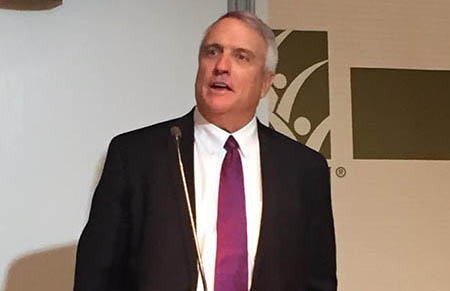Borrowing innovative ideas from research and other sectors, adjusting them, and scaling them up to meet the demand from developing country partners is essential if we are to make real progress toward creating a carbon-neutral world. Finding ways in which clean energy technology can be used to increase agricultural production without placing undue burdens on natural resources will be a necessary step toward helping we reach our emission targets moving forward.
According to Bill Ritter, former governor of Colorado, the challenges presented by climate change require solutions at the nexus of food, water, and energy–and the United States must be a leader in this global effort. The United States has made progress: along with China, the two largest emitters of greenhouse gases, it recently signed an agreement to reduce carbon emissions by 2025. The United States, however, is still debating the existence of climate change in Congress—the last government in the world to be openly discussing this in its legislature.
Governor Ritter shared his perspectives at a recent policy seminar held at IFPRI’s Washington, DC headquarters, based on his experience working both domestically and internationally with a variety of stakeholders to make clean energy a reality. A panel of experts joined Governor Ritter to further explore this nexus and outline a way forward toward full access to clean energy, particularly for lower-income countries.
One way forward is to replicate the success of mobile phones. According to the World Bank, three-quarters of the global population has access to mobile phones, yet 1.3 billion people worldwide still don’t have access to energy. IFPRI Senior Research Fellow Siwa Msangi explained that, throughout much of Africa, there is an informal sector-driven ecosystem available to support mobile phones. Harnessing that same combination of private and informal sectors when creating technology solutions to agriculture, water, and energy-related challenges will help initiatives and programs succeed. Claudia Ringler, deputy director of IFPRI’s Environment, Production, and Trade Division, echoed this, advocating the need for cross-sectoral communication to optimize the impact of agricultural innovations such as nitrogen efficient crop varieties and drip irrigation technology.
According to panelist Charles North, senior deputy assistant administrator for USAID’s Bureau for Economic Growth, the agriculture sector plays an important role, since 30 percent of greenhouse gas emissions currently come from agriculture, and food production will need to increase 70 percent by 2050 in order to feed an estimated nine billion people. Climate smart agriculture just makes sense, Alain Vidal from the CGIAR said, given that some estimates indicate agriculture could produce up to 70 percent of carbon emissions in the future.
The panelists agreed that when it comes to producing more food without depleting future energy and water resources, there is much to learn from what the private sector has already implemented. By ramping up partnerships that cut across sectors and by applying cutting edge technologies, we can overcome one of our greatest development challenges.







